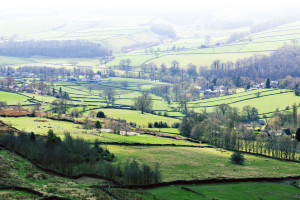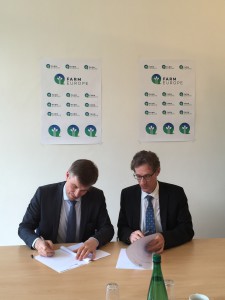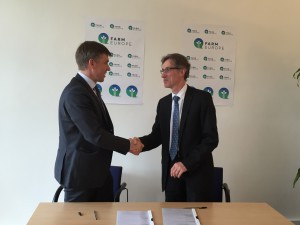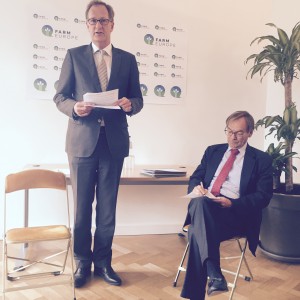 Tomorrow’s UK election is a pivotal time for the agriculture sector, the outcome will have varying impacts upon the future of farming in the UK. The Conservatives, Green Party, Labour, Liberal Democrats, Plaid Cymru, the Scottish National Party and UKIP have all discussed the Common Agricultural Policy in their 2015 manifestos, and have highlighted the significance of farming and agriculture.
Tomorrow’s UK election is a pivotal time for the agriculture sector, the outcome will have varying impacts upon the future of farming in the UK. The Conservatives, Green Party, Labour, Liberal Democrats, Plaid Cymru, the Scottish National Party and UKIP have all discussed the Common Agricultural Policy in their 2015 manifestos, and have highlighted the significance of farming and agriculture.
The Conservatives have stated in their manifesto that they ‘will push for further reform of the EU’s Common Agricultural Policy’. As part of this, they note that they ‘will push for high animal welfare standards to be incorporated into international trade agreements and into reform of the Common Agricultural Policy… We will ban wild animals in circuses and press for all EU member states to ensure that animals are only sent to slaughterhouses that meet high welfare standards’. Along with this promise of a reform push, the party have also noted that they ‘will help consumers buy British by pushing for country of origin labelling in Europe, particularly for dairy products…’. Despite the proposed CAP reform, the party notes that they ‘will spend £3 billion from the Common Agricultural Policy to enhance England’s countryside over the next five years’. The full Conservative manifesto can be found here here: https://www.conservatives.com/manifesto
The Green Party’s manifesto states that the party will ‘seek to reform the Common Agricultural Policy and reform our national agri-environment schemes to prioritise and support farmers who farm sustainably and enhance biodiversity on farmed land with a variety of farming styles, methods and scales’, as well as this the party pledges the promotion of ‘landscape-scale conservation, using reform of the Common Agricultural Policy, improved agri-environment schemes and the planning system. In particular, all farm payments should be designed to protect the soil, reduce flood risk, conserve wildlife, improve water quality, increase recreation and assist carbon capture’. Find the full Green Party manifesto here: https://www.greenparty.org.uk/we-stand-for/2015-manifesto.html
In the main Labour manifesto the party notes that they too will encourage reform of the CAP, ‘Labour will focus on the completion of the single market and tougher budget discipline, including on those items where spending at the EU level can save money at the national level. That means driving reform of the Common Agricultural Policy and a Commission-led zero-based review of spending on EU agencies to reduce waste and inefficiency’. Labour has also produced a separate rural manifesto. Within the separate manifesto there is no specific mention of the CAP. The party does state, though, that it ‘is clear that British farming’s best interest means remaining in the EU’ and that it ‘will champion farming in the EU to get the best for our farmers, including through better country-of-origin labelling’. Labour’s full manifesto can be found here: http://www.labour.org.uk/manifesto The rural manifesto can be found here: http://press.labour.org.uk/post/117595879344/labour-launches-rural-manifesto-and-pledges-to
In the Liberal Democrat manifesto the party states their desire for ‘continued reform of the Common Agricultural Policy, eliminating the remaining production and export subsidies and supporting the development of environmentally sustainable solutions to growing demand for food’. Further to this, the manifesto notes that they will ‘ensure farming support is concentrated on sustainable food production, conservation and tackling climate change, shifting CAP payments to the active farmer rather than the landowner’. Additionally, The Lib Dems state that they will work towards ‘reducing the proportion of the EU budget spent on the Common Agricultural Policy’. The manifesto also pledges to ‘work at EU level to ensure clear and unambiguous country of origin labelling on meat, meat products, milk and dairy products’. Find the full Liberal Democrat manifesto here: http://www.libdems.org.uk/read-the-full-manifesto
Within the Plaid Cymru manifesto the party states that it ‘will continue to support the Common Agricultural Policy that supports Welsh farming’. This is reiterated elsewhere in the manifesto, ‘we support the continuation of the Common Agricultural Policy that keeps over 80% of Welsh farms in business with direct payments. We opposed the maximum transfer of funds from Pillar One to Pillar Two. This took over a quarter of a billion pounds directly out of Wales’ rural economy’. Plaid Cymru also promise that they will ‘ensure that the Common Agricultural Policy works for Welsh farmers and that all farmers receive the fullest Basic Payment by 1st December 2015’. The Plaid Cymru manifesto can be found here: https://www.partyof.wales/2015-manifesto/?force=1
The Scottish National Party’s manifesto says that they ‘will look to secure a fair share of the UK’s CAP convergence uplift, which comes to the UK as a result of Scotland’s low hectare rates’. As well as this, the SNP pledges to ‘urge the UK government to work with the European Commission to deliver a simplified CAP, in particular with a review of direct payments and Greening, in line with proposals in the Brian Pack report to reduce red tape. We will also continue to press the Agriculture Commissioner to ensure Scottish farmers get clarity and certainty over the implementation arrangements for the new CAP’. Find the SNP manifesto here: http://www.snp.org
The United Kingdom Independence Party (UKIP) advocates leaving the EU, and thus severing ties with the CAP. The UKIP manifesto states that ‘outside the EU, free of the Common Agricultural Policy (CAP) and excessive regulations, we will be able to introduce fairer, simpler ways to support farmers’. Find the full UKIP manifesto here: http://www.ukip.org/manifesto2015
 Forest Owners), finalised the membership agreement between the MTK and the think tank FARM EUROPE, in Brussels.
Forest Owners), finalised the membership agreement between the MTK and the think tank FARM EUROPE, in Brussels. Farm Europe is committed to developing thinking on efficient ways to activate policy levers at EU level to increase both the competitiveness and the sustainability of the EU farming and food sectors and to step into the debate with concrete proposals. The think tank focuses on all policy areas that impact on rural business with a strong emphasis on agriculture and food policies, particularly the Common Agricultural Policy (CAP), but also food standards, the food chain, environment, energy and trade issues.
Farm Europe is committed to developing thinking on efficient ways to activate policy levers at EU level to increase both the competitiveness and the sustainability of the EU farming and food sectors and to step into the debate with concrete proposals. The think tank focuses on all policy areas that impact on rural business with a strong emphasis on agriculture and food policies, particularly the Common Agricultural Policy (CAP), but also food standards, the food chain, environment, energy and trade issues.
 outlined the key challenges ahead for the EU agriculture and food sector and explained how important the on-going changes, driven by President Jean-Claude Juncker, are. These changes relate to the structure of the new Commission, its working methods and priorities . Under the lead of Vice-president Timmermans, each Commissioner is instructed to undertake a critical assessment of policies and to ask the question as to whether such policies are absolutely essential at European level. Further, before any new major initiative, a consultation process and analysis phase has to be undertaken before a proposal could formally be adopted by the Commission, this takes up to 42 months. As such the Juncker Commission has defined the European Union’s key priorities with three key words – growth, jobs and investments.
outlined the key challenges ahead for the EU agriculture and food sector and explained how important the on-going changes, driven by President Jean-Claude Juncker, are. These changes relate to the structure of the new Commission, its working methods and priorities . Under the lead of Vice-president Timmermans, each Commissioner is instructed to undertake a critical assessment of policies and to ask the question as to whether such policies are absolutely essential at European level. Further, before any new major initiative, a consultation process and analysis phase has to be undertaken before a proposal could formally be adopted by the Commission, this takes up to 42 months. As such the Juncker Commission has defined the European Union’s key priorities with three key words – growth, jobs and investments.